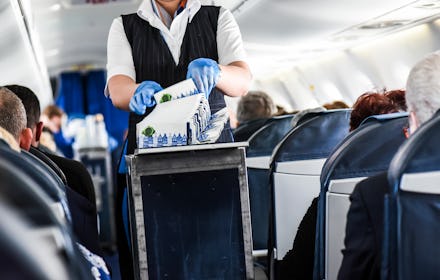The world's first zero-waste commercial flight cut 75 lbs of garbage. Now it's time we step up.

Air travel is undeniably terrible for the environment, due to the amount of waste typically produced by flights. Some forward-thinking companies are looking to change that standard, however, including Qantas. On May 8, the Australian airline launched the world's first-ever commercial zero-waste flight. On an trip from Sydney to Adelaide that took approximately two hours, there was absolutely no landfill waste, with all products used in-flight compostable, reusable, or recyclable.
According to a 2018 study, tourism is to blame for 10% of the world's carbon emissions, with air travel particularly at fault. Qantas' Sydney-Adelaide route, for instance, would typically produce 34 kilograms (75 pounds) of waste, with one thousand single-use plastic items needed for the journey. For the zero-waste flight, though, Qantas swapped those items out with sustainable alternatives like compostable meal containers made from sugar cane, and cutlery made from crop starch. Other items, like individually-packaged servings of milk and Vegemite, were simply removed from the flight. Any necessary plastic items and disposable organic material used on the trip will be recycled into new items, or composted.
The history-making flight was part of a larger effort by Qantas to encourage sustainability called The Bowerbird Project, named after an Australian bird known for reusing small items. The project includes plans to remove 100 million single-use plastic items from flights by the end of 2021, by replacing 45 million plastic cups, 30 million cutlery sets, 21 million coffee cups, and 4 million headrest covers with sustainable alternatives.
Qantas isn't the only airline beginning to take more eco-friendly measures. Delta and JetBlue, for instance, have been working towards implementing solutions to combat the waste created by travel, via the elimination of plastic straws and stirrers and the introduction of food waste redistribution programs.
Yet despite these efforts, the travel industry as a whole still has a lot more work to do in redesigning the flight experience to be more sustainable overall. Travelers can help by changing up their own actions; even if you're not flying Qantas, or an airline equally progressive in the no-waste movement, there are certainly still a few ways you can reduce your impact on the environment while flying.
It all starts with planning ahead. Use a digital boarding pass, bring your own reusable water bottle to refill at the airport (post security, of course), and if you can fit them, bring your own headphones and blanket as to not waste the disposable, plastic-wrapped versions distributed by airlines. If you order a beverage, consider asking for the whole can, rather than having it decanted into yet another wasteful plastic cup — we've all seen how high those things stack up when the flight attendants clear the tray tables.
If you're a coffee or tea drinker, traveling with your own reusable mug (plus a mini bottle of dish soap for cleaning purposes) is a sustainable way to indulge on any trip, as it'll let you avoid using a landfill-destined disposable cup. Taking advantage of reusable fabric snack pouches and containers can also cut down on your environmental impact and come in handy when packing up meals and snacks pre-flight.
And while it's illegal in America to drink alcohol not served by a flight attendant on any FAA-regulated aircraft, the rules can be flexible in other countries, nor is it illegal to carry on your own booze if it's been OKed by security. So instead of buying a few overpriced mini bottles at the airport prior to boarding, consider decanting your own liquor into a flask to save on both plastic and cash. Where you drink it is up to you, but you can take comfort in knowing your pre-planning is helping out the environment.